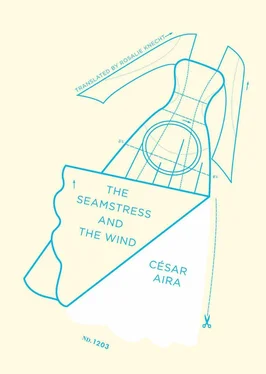DELIA SIFFONI WAS already crazy, and the disappearance of her only son drove her crazy again. She went into a frenzy. Prodigious spectacle, perennial postcard, transcendental cinema, scene of scenes: to see a madwoman go mad. It’s like seeing God. The history of the last decades has made this occasion stranger and stranger. Although I was a witness, I would not dare attempt a description. I defer to the judgment of the neighborhood, where the members of the same sex as the defendant always got the last word. The men were in charge of the men, the women of the women. My mother was an enthusiastic supporter of desperation when it came to children. According to her, there was nothing to do but howl, lose your head, make scenes. Luckily she never had to: she had German blood, she was discreet and reserved in the extreme, and I don’t know how she would have managed it. Anything less was equivalent to being “calm,” which in her allusive but very precise language meant not loving your offspring. Beyond desperation she saw nothing. Later she did see, she saw too much, when our happiness fell apart, but at that time she was very strict: the scene, the curtain of screaming — and beyond it nothing. The fact was, neither she nor any woman she knew had ever had to go mad with anguish; life was not very novelistic then. . The madness of a mother could only be unleashed, hypothetically, by some horrendous accident to her children. And everything happened to us — we were free, savage children — but not the definitively horrendous. We didn’t get lost, we didn’t disappear. . How could we get lost in a town where everyone knew each other, and almost everyone was more or less related? A child could only be lost in labyrinths and they didn’t exist among us. Even so, it did exist if only as a fear, the accident existed: an invisible force dragged the accident toward reality, and kept dragging at it even there, giving it the most capricious forms, reordering over and over its details and circumstances, creating it, annihilating it, with all the unmatched power of fiction. There lay the happiness of Pringles, and there it must still lie.
It can’t seem strange, then, that in the midst of that ordeal Delia saw herself before the abyss, before the magnetic field of the abyss, and she rushed forward. What else could she do?
THE ABYSS THAT opened before Delia Siffoni had (and still has) a name: Patagonia. When I tell the French I come from there (barely lying) they open their mouths with admiration, almost with incredulity. There are a lot of people all over the world who dream of traveling some day to Patagonia, that extreme end of the planet, a beautiful and inexpressible desert, where any adventure might happen. They’re all more or less resigned to never getting that far, and I have to admit they’re right. What would they go there to do? And how would they get there, anyway? All the seas and cities are in the way, all the time, all the adventures. It’s true that tour companies simplify trips quite a bit these days, but for some reason I keep thinking that going to Patagonia is not so easy. I see it as something quite different from any other trip. My life was carried to Patagonia on a gust of wind, in a moment, that day in my childhood, and it stayed there. I don’t think traveling is worth the trouble if you don’t bring your life along with you. It’s something I’m confirming at my own expense during these melancholy days in Paris. It’s paradoxical, but a journey is bearable only if it’s insignificant, if it doesn’t count, if it doesn’t leave a mark. A person travels, goes to the other side of the world, but leaves his life packed away at home, ready to be recovered on his return. But when he’s far away he wonders if perhaps he might have brought his life with him by accident, and left nothing at home. The doubt is enough to create an atrocious fear, unbearable above all because it is a baseless fear, a melancholy.
There’s always a reason given for rushing into things. That’s what reasons are for. The one Delia used was not only correct in itself but also appropriate for what had happened, along general lines, leaving some details aside. That day at noon, just when we were playing in the street, Chiquito had set out in his truck for Comodoro Rivadavia, carrying I don’t know what, probably wool. My Aunt Alicia, who rented him a room in her house, had seen him leave, after an early lunch she’d prepared for him. He’d filled the tank in the morning to prepare for the crossing and then climbed into the truck after lunch, started the engine and left in a hurry. What could be more natural than that a boy playing in the empty box might be imprisoned by the movement, fail to make himself heard, and be carried by accident to who-knew-where — a perfectly involuntary kidnapping? It was unlikely the truck driver would stop before nightfall, and by then he would already be past the Río Negro, well into Patagonia. Chiquito’s endurance was formidable, he was a bull, and in this case he’d even made some comment (and if he hadn’t made it, Alicia could well have invented it) about how urgently they were waiting for that shipment and how convenient it was to leave after a good lunch and make a long haul all at once, etc.
Several hours had already passed, and the whole neighborhood was on tenterhooks over the case of the lost boy. Mr. Siffoni had taken the matter in hand, although it might have been only to diminish his wife’s hysteria. As soon as the boy went missing a crisis was set off by the supposition of a forced departure in the truck’s cab or trailer, which was not entirely unreasonable. It was almost too obvious. The neighbor women were a little guilty of presenting it that way to Delia. Next they did something absolutely unheard-of: they called a taxi, so as not to lose another minute going after the truck. In Pringles there were two taxis, and they were only used for going to the Roca train station. One of them, Zaralegui’s, had to be called by phone. He must not really have understood the matter at hand, or he wouldn’t have undertaken the trip. It was absurd, since his 1930s Chrysler could never reach the cruising speed of a truck a quarter of a century more modern. But they didn’t think it was strange for the pursuer to be slower than the pursued. On the contrary, it seemed that by the logic of the long term it would have to catch up — what else could happen?
In the rush of departure, Delia, who was acting like a lunatic, snatched up her sewing kit and the wedding dress she was working on, thinking she could keep working during the journey, because the job was so urgent. Now, if that was the case, if the work was urgent, the neighbors might wonder, why didn’t she work, instead of spending the day keeping up with everything in the street? She was out of her mind at that critical moment: an enormous wedding dress with a vaporous white train and a volume exceeding her own (which was pretty meager) was the most awkward thing she could have chosen to bring. (I want to make a note here of an idea that may be useful later on: the only appropriate mannequin I can think of for a wedding dress is a snowman.) Besides, sewing a wedding dress in the back of a taxi, bouncing along those dirt roads that go south. . Where would her famous meticulousness end?
And she left, like a crazy woman. . The neighbors saw her go and stayed where they were, commenting and awaiting her return: The situation was so irrational they really thought she would be back at any minute. She hadn’t even locked up the house, she hadn’t even let her husband know. . That was enough to justify the neighbor women staying there on the sidewalk in a circle, gossiping and waiting for Ramon Siffoni so they could tell him his wife had left, desperate, crazy (like a good mother), and still wasn’t back. .
Читать дальше












